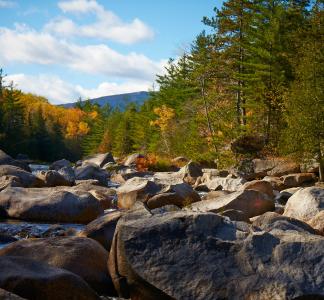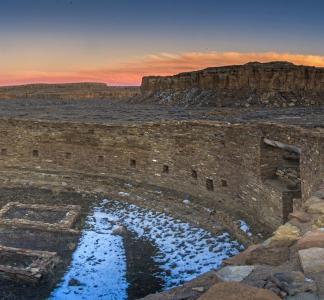Rep. Deb Haaland advances toward confirmation at Interior Department

Rep. Deb Haaland, President-elect Joe Biden's nominee to lead the Department of the Interior
American Federation of Government Employees, Flickr
Strong conservation record recommends quick Senate approval
UPDATE: On a bipartisan basis, the Senate Energy & Natural Resources Committee voted on March 4 to recommend Deb Haaland's nomination to the full Senate. The Senate will consider whether to confirm her in the coming weeks.
President Joe Biden has chosen a tried and true champion of climate and conservation to lead his Department of the Interior, setting the stage for the crucial project of making public lands a major part of the solution to the climate crisis over the next four years: Rep. Deb Haaland.
Rep. Haaland, a member of the Laguna Pueblo, would be the first Native American to lead a Cabinet-level agency. Given the track record of the Department of the Interior failing to consult with Indigenous leaders or enacting public lands policies against the best interests of Indigenous people, Haaland's appointment would be both historic and a much-needed step toward reckoning with a long and troubling legacy.
Rep. Haaland has said she would work to undo public lands policies that have led to a shortsighted focus on fossil fuel development, instead expanding renewable energy production. Fossil fuels drilled and mined on public lands account for nearly one-quarter of U.S. greenhouse gas emissions, and experts say addressing such development would be an important step in confronting climate change.
"Rep. Haaland is a passionate advocate for climate action, stewarding public lands and conserving them for future generations." - Jamie Williams, president of The Wilderness Society
Of special significance, Rep. Haaland is a steadfast advocate for Tribal and Indigenous rights and the protection of cultural resources in places like New Mexico’s Chaco Canyon and Utah’s Bears Ears National Monument. She has also been an outspoken champion for the Gwich’in people and protection of the Arctic National Wildlife Refuge on which they rely.
Additionally, Rep. Haaland has been a leader in pushing the U.S. to embrace a national goal of protecting 30 percent of lands and waters by the year 2030, which scientists say will help stem the ongoing extinction crisis and deterioration of the natural world.
“Too often in our nation’s history, the Interior Department has been unjust to recognized tribes and Indigenous communities in the United States, and Rep. Haaland’s stewardship will make history and could begin to heal these deep wounds,” said The Wilderness Society President Jamie Williams in a statement. “In addition, Rep. Haaland is a passionate advocate for climate action, stewarding public lands and conserving them for future generations. TWS wholeheartedly supports rapid confirmation of this highly qualified nominee.”
Key accomplishments of Rep. Deb Haaland:
-
Was an original cosponsor of a bill directing the Department of the Interior and U.S. Forest Service to to achieve net-zero greenhouse gas emissions from public lands and waters, recognizing the key role of fossil fuels extracted on public lands in driving climate change.
-
Introduced a House resolution to adopt a goal of protecting 30 percent of U.S. lands and waters by the year 2030, a widely touted target based on scientists’ recommendations for responding and adapting to climate change and curbing the extinction crisis.
-
Introduced legislation that would set the stage for reviewing and potentially changing offensive and racist names of parks, national forests, wilderness areas, monuments, mountains, rivers and other places.
-
Was an original cosponsor of a bill to restore and expand protection of Bears Ears National Monument which was unlawfully reduced by President Trump. The measure would protect the full area originally proposed by the Bears Ears Inter-Tribal Coalition, an alliance of five sovereign tribal nations: the Navajo Nation, Hopi Tribe, Ute Indian Tribe, Ute Mountain Ute Tribe, and Pueblo of Zuni.
-
Introduced legislation to protect Chaco Canyon from harmful oil and gas drilling around the park. Chaco Canyon was a major center of Ancestral Puebloan culture and the area includes important archaeological sites and structures that are among the most significant intact examples of pre-Columbian culture.
-
Cosponsored a bill to permanently fund the Land and Water Conservation Fund, which is considered a crucial tool for guaranteeing access to public lands and helping ecosystems and communities mitigate and adapt to the effects of climate change.
-
Cosponsored legislation to improve the permitting system for outfitters, guides and others who lead activities on national parks and other public lands.
-
Spearheaded a bill to establish Cerro de la Olla Wilderness within the Río Grande del Norte National Monument in northern New Mexico. The measure aimed to preserve traditional uses and access for the people of the Taos area, who have been hunting and gathering herbs in the area for hundreds of years.
-
Cosponsored the America’s Public Land Act, a move to prohibit the Department of the Interior and Department of Agriculture from selling public lands or giving management authority to state officials. The bill was a response to fringe anti-conservation beliefs that ended up heavily informing the policy views of the Trump administration.
Rep. Debra Haaland leads push to protect 30% of our land and ocean by 2030
Elliotsville Plantation, Inc.
Justice for Bears Ears: New Congress offers chance to make things right
Mason Cummings, The Wilderness Society
3 reasons to protect Greater Chaco Canyon from oil and gas drilling
Andrew Kearns/FLICKR CC BY 2.0




